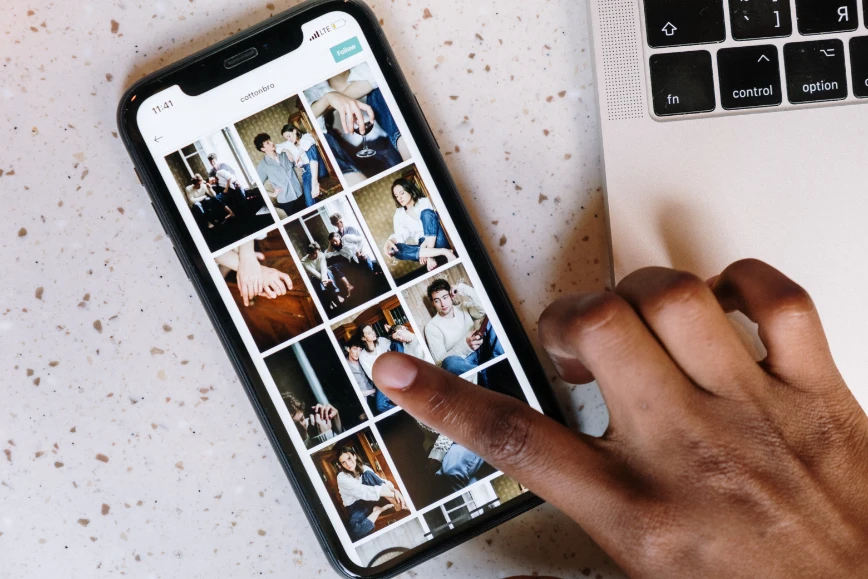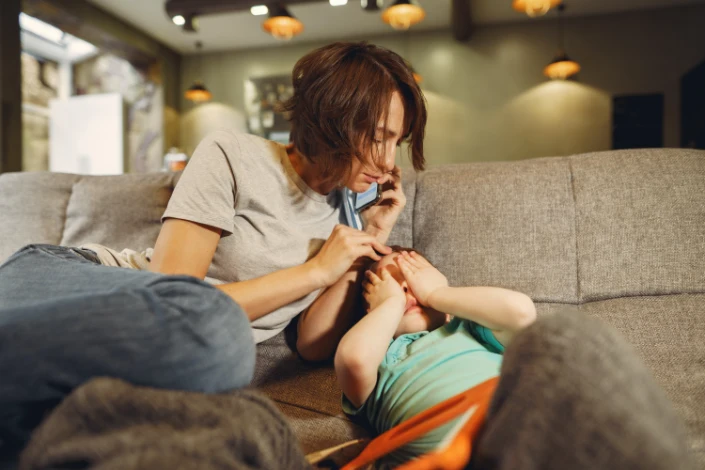Social media has become deeply ingrained in our daily lives. Platforms like Facebook, Instagram, Twitter, and TikTok have billions of users who spend countless hours scrolling, posting, and interacting online.
While social media allows us to stay connected, informed, and entertained, excessive use can harm our mental health, focus, productivity, and overall well-being. This has led many people to start examining their technology habits and consider taking a break from social media – also known as a “digital detox.”
Disconnecting from social media, even temporarily, can provide many benefits. A social media detox (Disconnect Social Media) involves refraining from using platforms like Facebook and Instagram for a set period of time. This allows you to take a step back and break free from the constant notifications, endless scrolling, and non-stop exposure to curated content.
According to recent surveys, 54% of teenagers felt more anxious and depressed after using social media. Additionally, 35% of adults feel overwhelmed by the onslaught of information and the pressure to stay constantly updated on social platforms. These statistics indicate the need for more mindful technology use and the importance of disconnecting occasionally.
In this article, we will explore why disconnecting from social media is beneficial, outline strategies for taking a break from technology, and provide tips on creating healthy social media habits. By being more mindful of how and when you engage online, you can gain better control over your technology use.
Reasons to Disconnect from Social Media
Social media has become such an integral part of daily life that disconnecting from it can seem daunting or extreme. However, there are many compelling reasons why taking a deliberate break from social media can benefit your mental health and overall well-being.
Some of the main motivations for temporarily disconnecting from social platforms:
Digital Detox and Break from Technology
A digital detox, or social media detox, involves taking an intentional break from technology and online platforms. This allows you to unplug and recharge mentally. Constant connectivity can be mentally draining, so a detox gives your mind much-needed rest. A short technology break can make you feel more relaxed, clear-headed, and rejuvenated.
Scheduling regular digital detox days or weeks can establish healthy boundaries with technology. Some activities to fill your time during a detox include reading, exercising, spending time outdoors, engaging in hobbies, or connecting with friends and family offline. A digital detox provides a balance against the overload of screen time and information in everyday life.

Improve Mental Health and Well-Being
Excessive social media use has been linked to increased symptoms of anxiety, depression, stress, loneliness, and low self-esteem. This is often attributed to negative social comparison and constant exposure to filtered content portraying unrealistic standards for beauty and success.
A social media sabbatical can provide immediate relief from constant comparison and negative thought patterns. Your mental bandwidth will expand during a detox, leaving more room for meaningful thoughts and real-world experiences.
Reduce Anxiety, Depression, and Loneliness
While social media presents the illusion of connectivity, research has found that increased usage can correlate to higher reported feelings of anxiety, depression, and loneliness. Platforms like Facebook and Instagram emphasize selective curation over authenticity, which exacerbates fear of missing out (FOMO) when viewing the carefully crafted online personas of others.
Taking a break from all platforms allows you to disengage from the façade of perfection. Your perspective will become grounded in real-world experiences and connections instead of the manipulated ‘highlight reels’ prominently displayed online. Authentic, meaningful human connections will flourish without the distraction of fabricated social media relationships.
Avoid Fear of Missing Out (FOMO) and Social Comparison
The fear of missing out, or FOMO, is a predominant side effect of frequent social media use. When you compulsively check apps to stay constantly updated on what others are doing, feelings of anxiety and inadequacy often follow. Wondering whether you should have been invited or could have participated leads to unhealthy social comparison and self-criticism.
Taking a deliberate break from social platforms allows you to disengage from the illusion that others have better, more exciting lives. In reality, people selectively display their happiest moments, not their everyday mundane experiences.
Disconnecting lets you realize that you are not missing out on anything meaningful. With less downward social comparison, you will feel more secure and self-assured.
Enhance Productivity and Focus
Social media is designed to be addictive – the endless stream of content, likes, and notifications competes heavily for our attention against essential tasks. As a result, excessive social media severely hampers productivity and concentration. Just having your phone nearby while working can fracture your focus.
Stepping away from social platforms reduces distractions and interruptions, allowing you to be more present and attentive in your daily responsibilities and activities. Removing tempting apps makes it easier to avoid mindless scrolling. Your ability to concentrate will improve without the distraction of alerts and updates.
Improve Sleep Quality and Duration
The blue light emitted from screens suppresses melatonin production, making it harder to fall and stay asleep. Additionally, the stimulation and draw of social media leads to later bedtimes as users endlessly scroll before trying to sleep. However, adequate rest is crucial for both physical and mental health.
A social media detox can significantly improve your sleep habits. Avoiding devices before bed will help you fall asleep faster and sleep more soundly through the night. Your mood will lift with better-rested days. Setting your phone aside earlier also allows you to establish a more consistent evening routine to relax and unwind before bed.
How to Disconnect from Social Media
Taking a deliberate break from social media requires some planning and effort but can be very rewarding. Some of the practical strategies and steps for successfully disconnecting from platforms like Facebook, Instagram, and Twitter are:
Conduct a Social Media Audit
Before embarking on a social media detox, take time to reflect on your current usage by conducting an audit.
- Review your screen time statistics to understand how much time you actively spend on social platforms.
- Consider which apps you check most frequently and what prompts you to check them. Is it boredom or habit?
- Identify when you use social media most heavily, such as mornings, evenings, or when you should be working.
- Take note of how social media makes you feel – do you feel FOMO, anxiety, or comparison?
- Assess the value you get from social media and what purposes it serves, both positive and negative.
After completing the audit, you’ll have critical insights into your usage that can inform your detox plan.
Remove Apps from Phone
A powerful yet simple way to instantly reduce social media access is by deleting apps from your smartphone.
- Delete social media apps like Facebook, Instagram, Twitter, TikTok, etc. Remove both the apps themselves and the convenient shortcuts from your home screen.
- If you can’t bring yourself to delete apps entirely, consider moving them off your home screen into a folder buried in your app library. Adding friction makes accessing them more conscious.
- On iPhones, use Screen Time restrictions to block apps for a set period. Android users can try App Block or Stay Focused apps to disable apps.
- Remove push notifications for social apps so that they can’t pull your attention. Disable Badges to remove those distracting red notification bubbles.
Restricting social app access on your phone breaks impulse checking habits and reduces idle browsing.
Disable Notifications
Push notifications are designed to draw your eyes back to apps through sounds, pop-ups, and screen interruptions. Disable notifications to prevent this distraction:
- Turn off all non-essential notifications – email, texts, and phone calls can stay while social apps get muted.
- On iPhones, go to Settings > Notifications > [App Name] and select off. On Androids, go to Settings > Apps & Notifications > Notifications > [App] > Block all.
- In social media, app notification settings themselves, opt out of all notification types, including emails and texts.
- On desktop browsers, disable notifications from popping up for sites like Facebook and Twitter through browser notification settings.
With notifications disabled, your devices become less demanding on your attention when trying to focus elsewhere. Checking social media becomes a conscious choice rather than a Pavlovian response.
Schedule Specific Times to Check Social Media
Rather than aimlessly browsing throughout the day, restrict social media to specific times to contain usage.
- Choose 2-3 set times to check platforms, such as at lunchtime and before bed. Short-time windows prevent endless scrolling.
- Remove social media browsers and apps from your phone and devices to limit access to these set times on your desktop computer.
- Use website blockers like ColdTurkey or Forest to only allow access during scheduled hours.
- When time’s up, close the browser or App so your allotted time isn’t frittered away thoughtlessly.
Scheduling contained social media time requires discipline but helps curb mindless usage.
Unfollow Non-Essential Accounts
Be more selective about whose content you consume by unfollowing accounts that don’t bring you joy or add value.
- Unfollow friends and influencers who contribute to jealousy, unhealthy comparisons, or make you feel bad about yourself.
- Unlike Pages or mute accounts that frequently spark negative emotions like outrage, annoyance, or boredom. Curate your feed.
- Focus on accounts that post thoughtful content, inspire you, make you laugh, or align with your interests and values. Quality over quantity.
- Limit follow sprees. Be intentional about adding new accounts assessing if they are worthwhile.
Following fewer accounts fosters a more positive experience and reduces excessive scrolling.
Take a Temporary Break
If you’re feeling truly overwhelmed, take a temporary hiatus by deactivating your social media accounts for a set period.
- Schedule your break in advance, so you have something to look forward to when reactivating. Aim for one week, a month, or longer.
- Back up any data like photos you want to save from your profiles before deactivating.
- Delete social apps from devices so you aren’t tempted to reactivate early. Ask someone to change your account passwords during the break.
- Post a break announcement so friends know not to take your absence personally. Turn off tagging ability.
- Consider extending your break if you are thriving without social media back in your life. But avoid substituting with other mindless apps.
Completely removing the option to check accounts allows you to fully immerse in the benefits of disconnecting.

Replace Social Media Time with Other Activities
Have alternatives ready to fill your newfound free time when avoiding social media.
- Brainstorm new hobbies, like learning an instrument, painting, woodworking, yoga, or reading more.
- Spend more time outdoors exercising, hiking, or just appreciating nature. Socialize offline with friends and family.
- Find productive ways to fill spare minutes, like tidying, meal prepping, or knocking out errands. Listen to podcasts or audiobooks while doing chores.
- Prioritize passion projects and things you always claim you don’t have time for, whether career-focused or just for fun.
- Relax through meditation, long baths, or just sitting idly. Let your mind wander without digital stimulation.
Having planned replacement activities prevents boredom and reduces the appeal of slipping back into old social media habits.
Disconnecting from social media requires forethought and discipline, but these strategies make temporary digital detoxes manageable. By being purposeful in your usage, social platforms can be enjoyable again without becoming a harmful addiction.
Benefits of Disconnecting from Social Media
Social media has become an essential part of modern life. Platforms like Facebook, Instagram, Twitter, and TikTok have billions of users across the globe. While social media provides many benefits, like staying connected with friends and family, getting news and entertainment, and sharing your life, it also has downsides.
Constant connectivity can negatively impact focus, stress levels, real-life relationships, and sleep habits.
More Time for Real-Life Connections and Activities
Social media takes up a significant chunk of time for many people. A 2021 survey found adults spend almost 2.5 hours per day on social networks and messaging. Disconnecting frees up this time to be present with loved ones, engage in hobbies and self-care, and connect with your local community.
Without the constant pull of notifications and feeds, you can give your full attention to activities and people right in front of you. Go for a long walk with your partner, play a board game with your kids, have an uninterrupted catch-up with a friend, or take up a new hobby like painting or gardening.
Improved Focus and Productivity
Social media is designed to grab your attention with a non-stop content stream. This can make it challenging to stay focused on tasks. Frequent social media use is linked to decreased attention span and lower productivity.
Disconnecting removes distractions and interruptions so you can fully concentrate on work and studies. With apps turned off, you can get into a flow state and make significant progress on big projects. Your ability to think deeply, problem-solve, retain information, and learn new skills will improve without constant pings for your attention.
Reduced Stress and Anxiety
While social media offers connection opportunities, it can expose you to excessive negativity, toxic arguments, unrealistic standards, and polarizing perspectives. This can raise stress hormones and trigger anxiety.
Without the burden of this harmful content, you’ll likely find your mood improves after a social media detox. Spending less time in emotionally charged online spaces lets you approach life from a calmer, more centered perspective.
Disconnecting also creates more opportunities for stress-relieving activities like meditation, exercise, time in nature, or self-care practices. You gain perspective on what matters most to your well-being.
Better Sleep Habits
The blue light emitted from screens suppresses melatonin production, making it harder to fall and stay asleep. Social media right before bed can also stimulate your mind, delaying sleep onset. This disrupted sleep impacts your mental sharpness, productivity, mood, and long-term health.
A social media detox allows you to establish a consistent pre-bedtime routine free of screens. Reading a book, stretching, writing in a journal, or spending time with loved ones are all great ways to unwind before bed without blue light.
Getting adequate, good-quality sleep will leave you feeling more energized and clear-headed during the day. Your concentration, learning, and decision-making abilities will benefit.
Healthier Balance Between Online and Offline Life
While social media has upsides, research shows spending too much time online can increase anxiety, depression, and loneliness. It reduces life satisfaction and psychological well-being.
Disconnecting lets you find a healthier balance between the online world and real life. You can remain informed and connected online without letting it overtake your life. After detox, many people regain an appreciation for simple real-life pleasures like going for a walk, cooking a meal, or reading a novel.
By spending more time offline, you open up space to discover what activities bring you joy, meaning, and purpose. Social media is still there when you want it, but real life takes priority.

Challenges of Disconnecting from Social Media
While limiting social media usage has many benefits, it also has some challenges. Disconnecting from platforms you use constantly can take adjustment. Knowing potential obstacles can help you prepare for a social media detox.
FOMO and Feeling Disconnected
Fear of missing out (FOMO) is why people find it hard to take a break from social media. When you stop scrolling feeds, you naturally miss updates, conversations, memes, and online trends. This can cause feelings of disconnection or loneliness, especially if social platforms are your primary way of engaging with certain people.
Difficulty Breaking Habits
For many users, checking social media is a deeply ingrained habit. Platforms are designed to keep you coming back frequently. Breaking habits requires concerted effort, even when you want to change.
Be prepared for just how often you may reflexively reach for your phone to open social apps. Identify when you’re most prone to this behavior, like boredom or avoiding tasks. Have a plan for what to do instead, whether going for a walk, calling a friend, or engaging in a hobby.
Pressure from Friends and Family to Stay Connected
Another common challenge is pushback from friends and family accustomed to constant contact via social media. Some may feel hurt that you’re not keeping up with their posts and sharing updates. Others may protest or ridicule your attempt to take a break from social platforms. Peer pressure can sabotage your efforts.
To mitigate this, clearly communicate your reasons for disconnecting and your intentions moving forward. Reassure close ties that you still want to stay in touch through other channels like phone calls, texts, or face-to-face hangouts. Suggest specific ways they can support your social media detox.
Tips for Overcoming Challenges
Some essential tips to help you through the challenges of disconnecting from social media:
- Make a plan for what to do when FOMO or habits strike, like going outside or calling a friend
- Reframe FOMO as an opportunity for new experiences instead of missing out
- Start small, like taking one day off social media, then build up
- Remind yourself why you’re taking a break and the benefits for your well-being
- Communicate clearly with friends/family and suggest other ways to connect
- Enlist an “accountability buddy” who can support your social media detox
- Notice when you feel anxious without social media and sit with the feeling until it passes
- Delete social apps from your device so the habit cues are removed
- Mark milestones and celebrate successes in replacing social media habits
With determination and self-compassion, these challenges can be overcome. The benefits of a social media reset often make pushing through temporary discomfort worthwhile.
Creating Healthy Social Media Habits
While completely disconnecting from social media isn’t feasible or desirable for everyone, you can take steps to develop healthier habits around social media use. Limiting your time on platforms and being more mindful and intentional with your interactions can help you better manage its influence on your life.
Set Time Limits for Usage
One of the most effective ways to curb excessive social media use is to set defined time limits for how long you engage with different platforms daily or weekly. Let’s have a look at some tips for implementing limits:
- Audit your current use to determine reasonable daily or weekly caps for each platform.
- Set screen time limits on your device’s settings or use an app that restricts usage after a specific time per App.
- Use a timer or alarm to alert you when your allotted social media time for the day is ending.
- Schedule social media use for certain times of day, such as one hour in the morning and evening.
- Take one or two full days off each week when you don’t access social platforms.
- Adjust limits gradually over time to find the right balance for you. The ideal amount of usage will depend on your individual circumstances.
Honoring defined boundaries requires conscious effort but can go a long way in developing healthier social media habits long-term.
Enable Do Not Disturb Modes
Apps provide various do-not-disturb modes that mute notifications for a set period of time. Turning these on helps minimize disruptions and prevents constantly checking your phone. Options include:
- Do Not Disturb or Focus Mode on iPhone settings
- Turn off notifications for individual apps on Android
- Enable Scheduled Quiet Hours for certain times or locations
- Use Wind Down on your iPhone to disable notifications at bedtime
- Activate Out of Office mode on Slack and email
Determine when distracting notifications are most problematic for you and leverage these do-not-disturb features liberally.
Follow Accounts Selectively
Be selective about who you follow on social platforms. Only follow accounts that align with your interests and values or that inspire you in a positive way. Prune your lists occasionally to remove any that frequently cause negative feelings or fail to serve you well.
Additionally, I favor connecting with real friends and family more than influencers, celebs, or brands. Interacting with people you have authentic relationships with brings more genuine social benefits.
Use Time Blocking Apps
Apps like Freedom, Flora, and Offtime allow you to block access to social media and other distracting websites during designated time blocks. Set these up for periods when you want to be focused on work, family, or hobbies without interruption.
Combine time blocking with other methods like turning off phone notifications for powerful focus sessions free of online distractions. Gradually increase the length of time you can sustain concentration offline.
Engage Mindfully and Intentionally
Aim to engage with social platforms mindfully rather than mindlessly scrolling and clicking. Few tricks are:
- Pause before sharing or posting anything, and consider if it’s valuable.
- Read articles fully before liking or commenting.
- favor commenting over simply liking posts.
- Ask yourself how you feel after using certain platforms and if interactions are uplifting.
- Limit passive video watching – be selective about which videos you invest time in.
- Follow creators who share thoughtful, educational content rather than clickbait or sensationalism. Creating healthy social media habits requires making conscious choices about online engagement. But with some effort, you can use platforms in moderation and for greater benefit without letting them dominate your time and attention.
Tips for Staying Disconnected from Social Media
After an initial social media detox, it can be challenging to resist the pullback to old habits. With some intention and planning, you can make your disconnection stick long-term. Here are some top tips to stay disconnected from social media:
Find an Accountability Partner
Let your partner, friend, or family member know about your commitment to reduce social media use. Check-in with them regularly on your progress and challenges. Having social support makes it easier to uphold boundaries when temptation strikes.
An accountability buddy can gently remind you of your goals if you start slipping back to excessive use. They help provide perspective and encouragement to keep going.
Remove Apps From Your Home Screen
Out of sight, out of mind. Remove tempting social media apps from your phone’s home screen and tuck them away in a folder buried deeper in your menu. This creates extra steps before you can tap on them, which discourages the mindless loading of apps.
Disable Notification Alerts
Notifications are designed to pull you back in. Go into your device settings and turn off all alerts related to social media apps. This removes the Pavlovian trigger of pings and buzzes associated with new posts or messages.
You can also selectively disable notifications during certain times of the day or on specific days, such as Do Not Disturb time. Regain more control over when and how often you check apps.
Avoid Mindless Browsing
When you do access social media, avoid aimlessly scrolling feeds without purpose. Set a specific intention, like connecting with a particular friend or checking for an event invite. Accomplish that task, then exit the platform.
Implicitly limit the amount of time you spend whenever you open apps. Checking in frequently but briefly prevents wasting hours mindlessly browsing.
Carry Out Tech-Free Activities
Replace online time with activities that allow you to unplug completely. Things like hiking, reading, social events, household chores, or quality time with loved ones keep hands and eyes busy offline. Look for screen-free hobbies to get absorbed in.
Make a plan for tech-free activities in advance so you already have go-to options when the urge to use social media arises. Enlist others to join you for accountability.
Reflect on Experiences and Benefits
Take time periodically to reflect on how decreased social media use has impacted your life. What benefits have you noticed? How has it affected your mood, focus, relationships, or stress?
Consider keeping a journal to record your progress and document positive changes. This helps crystallize the advantages of disconnecting so you stay motivated.

Key Takeaways on Disconnect Social Media
Social media has become deeply ingrained in modern life. But constant connectivity can negatively impact mental health, relationships, productivity, sleep, and overall well-being. Taking a temporary break or reducing long-term social media usage has numerous advantages.
Disconnecting from social platforms, even for short periods, can help:
- Free up more time for offline connections and activities you find meaningful
- Reduce distractions and regain focus so you can better concentrate on work/studies
- Lessen anxiety, depression, and sleep issues exacerbated by excessive social media use
- Develop healthier digital habits through reduced usage and more mindful engagement
- Improve your mood and mental clarity when not immersed in negative online spaces
- Strengthen real-world relationships by giving loved ones more quality attention
While initial adjustment can be challenging, most who complete a social media detox report feeling happier, more focused, and less stressed overall.
Taking the First Step
If you want to enjoy the many perks of disconnecting from social media, start small. Try a one-day break from all platforms and notice how you feel. Once you tackle a single day, build up to a weekend digital detox.
Gradually extend your breaks, like taking one week off of Facebook. Over time, aim for longer detoxes from your most used platforms.
Replace online time with meaningful offline activities you’ve been neglecting, like exercising, spending time outdoors, engaging in hobbies, or being fully present with loved ones.
Leverage tools like time limit settings, website blockers, and accountability partners to successfully maintain boundaries. Be patient as you form new, healthier habits.
Make Disconnection a Lifestyle
For lasting benefits, work toward making disconnecting from social media a regular part of your lifestyle. Facilitate balance between the online and offline worlds long-term.
Avoid restricting usage through time limits, platform fasts, and screen-free activities. Check in with yourself frequently about how social media impacts your well-being and when usage starts creeping up.
With concerted effort, you can thrive in modern life while making space for focused work, deeper connections, mental clarity, and personal joy away from social platforms. So, Give yourself the gift of real life – start your social media detox today.
Taking a temporary break from social media can help reduce stress and anxiety, improve your ability to focus and concentrate, allow more time for meaningful real-life connections and activities, and establish healthier digital habits long-term. A social media detox can provide perspective on how platforms impact your mood and mindset.
Disconnecting from social media, even for short periods, can improve your sleep quality, boost productivity, reduce feelings of loneliness and depression, help you rediscover activities you enjoy, strengthen real-world relationships, and create more balance between the online and offline parts of your life.
Strategies to help successfully disconnect from social media include turning off notifications, deleting social apps from your phone, finding an accountability partner, scheduling tech-free time on your calendar, engaging in offline hobbies, communicating your break to friends/family, and replacing social media activities with more meaningful connections and self-care practices.
While you can benefit from an extended detox, permanently quitting major social platforms may isolate you socially in the long run. A balanced approach of moderated, mindful social media use integrated as just one aspect of a full, offline-focused life is ideal for most. Occasional detoxes can reset unhealthy habits.



